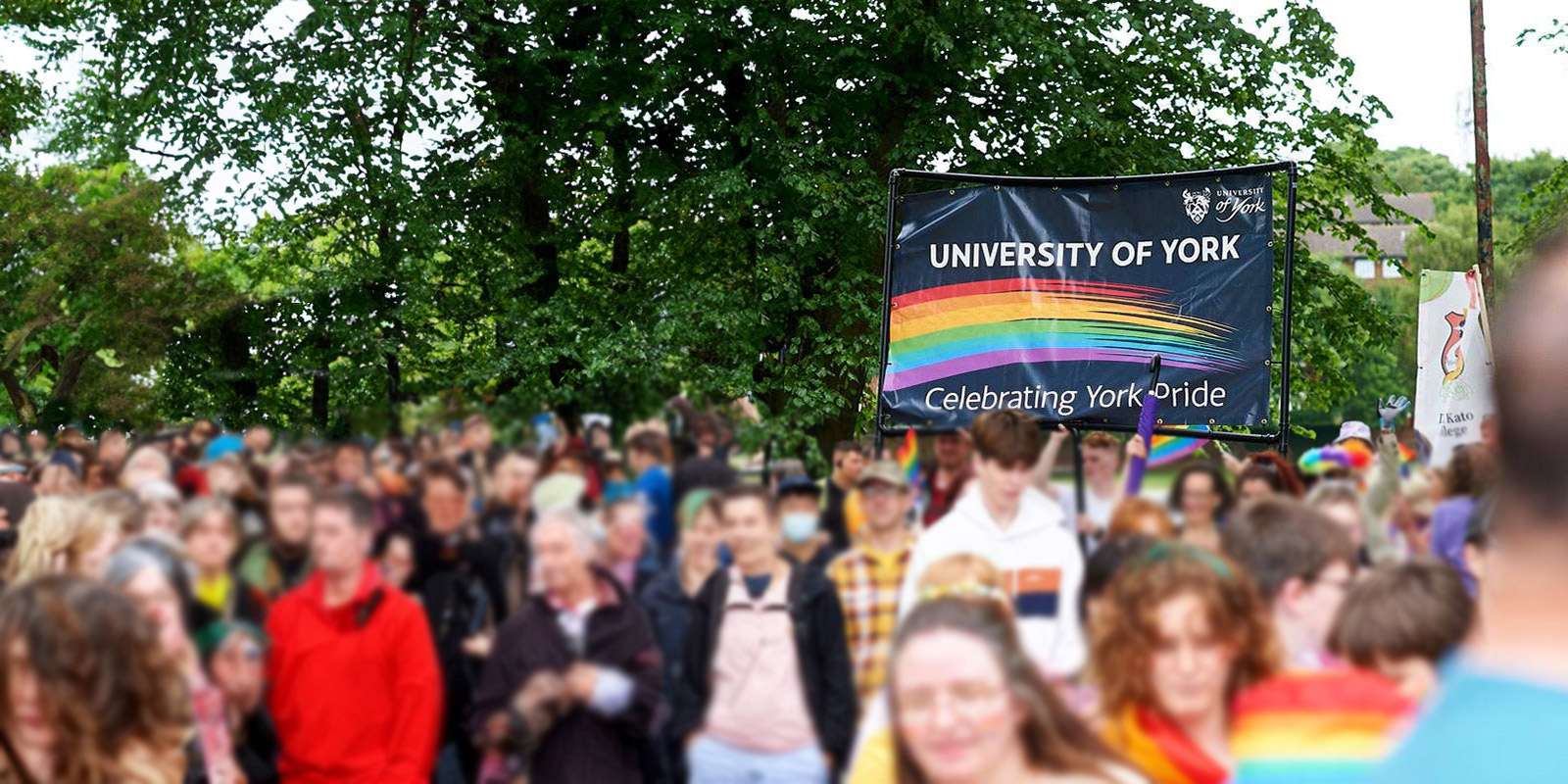View semester dates
2 years part-time

Explore the cultures that shaped us, and the cultures we shape, through an intersectional queer lens.
Year of entry: 2026 (September)
This course offers you the opportunity to explore LGBTQIA+ identities, communities, and cultures from a range of disciplinary perspectives.
You'll encounter primary materials from across the arts and humanities—which may include literary texts, auto/biographies, films and documentaries, visual artworks, manifestos and zines, and sound recordings and songs—along with the latest theory and criticism. Throughout the programme, you will benefit from research-led teaching by internationally recognised experts in queer studies, while also being guided and supported in your own original research.
You'll be supported by a rich schedule of research seminars, conferences, and reading groups, and you'll be invited to play an important role in the thriving research culture of the faculty.
In semester one, you will take the interdisciplinary core module ‘Queer Studies Across Disciplines’ and a second module selected from a diverse range of options. In semester two, you will take two option modules.
You will also study three option modules. Examples can be found below. Some option module combinations may not be possible. The options available to you will be confirmed after you begin your course.
Our modules may change to reflect the latest academic thinking and expertise of our staff, and in line with Department/School academic planning.
The dissertation is the pinnacle of the programme, and allows you to conduct an independent research project in an area (or areas) of queer studies, building on the critical and theoretical skills that you have developed in seminars and workshops.
Every course at York is built on a distinctive set of learning outcomes. These will give you a clear understanding of what you will be able to accomplish at the end of the course and help you explain what you can offer employers. Our academics identify the knowledge, skills, and experiences you'll need upon graduation and then design the course to get you there.

Now more than ever, amidst a global climate of queer hostility, queer studies is vital to our understanding of history, culture and society. This MA offers fresh, interdisciplinary, and intersectional approaches to seminal queer art; it is at the forefront of academic research.
| Study mode | UK (home) | International and EU |
|---|---|---|
| Full-time (1 year) | £12,000 | £26,900 |
| Part-time (2 years) This is the year 1 fee. Fees for future years are subject to confirmation. |
£6,000 | £13,450 |
Students on a Student Visa are not currently permitted to study part-time at York.
For courses which are longer than one year, the tuition fees quoted are for the first year of study.
UK (home) or international fees? The level of fee that you will be asked to pay depends on whether you're classed as a UK (home) or international student. Check your fee status.
Find out more information about tuition fees and how to pay them.
You'll need copies of the texts set for each module. Where possible, we will provide digital access. We'll let you know which texts and editions you'll need to buy (whether new or second-hand) before the start of each semester.
Discover your funding options to help with tuition fees and living costs.
We'll confirm more funding opportunities for students joining us in 2026/27 throughout the year.
If you've successfully completed an undergraduate degree at York you could be eligible for a 10% Masters fee discount.
We are pleased to work with Chevening Scholars to offer funding for our Masters programmes. Chevening Scholarships provide one year of fully-funded postgraduate study in the UK for international (including EU) students. The scholarships are open to early and mid-career professionals who have the potential to become future leaders.
You’ll work with world‐leading academics who’ll challenge you to think independently and excel in all that you do. Our approach to teaching will provide you with the knowledge, opportunities, and support you need to grow and succeed in a global workplace.
You'll normally attend two 2-hour seminars each week. If you are a part-time student you'll attend one 2-hour seminar a week.
Seminar groups consist of fewer than 16 students in most modules, though some core modules may involve a larger number of students. You'll complete essential reading for each seminar, and we encourage you to read more widely around the topic.
You'll attend a series of training lectures and workshops, designed to address presenting your work, writing at MA level, transferable skills, and career development.
Over the course of the year, you'll have the opportunity to attend research seminars and conferences hosted by the Department. You can also attend events organised through the Humanities Research Centre, a stimulating community unique to York.
You can make use of our dedicated study spaces, including the F.R. Leavis Room and the Writing lab, to work, collaborate and socialise in.
York's library contains a rich variety of resources available to you. This includes, but is not limited to:
The city of York also boasts rich, scholarly resources in a student-friendly and contemporary environment. You can immerse yourself in a range of public libraries and archives around the city and region.
You will be based in the Department of English and Related Literature on Campus West. Most of your contact hours will be in locations nearby on Campus West.
Our beautiful green campus offers a student-friendly setting in which to live and study, within easy reach of the action in the city centre. It's easy to get around campus - everything is within walking or pedalling distance, or you can always use the fast and frequent bus service.
You'll submit an essay of 3,500-4,000 words for each module. The Postgraduate Life in Practice module will be assessed on the completion of a series of tasks connected to your core work for the MA. Your final assessment is a dissertation of 12,000-14,000 words.
This course provides an excellent grounding if you wish to pursue further academic study and careers in academia, education, and the cultural sector.
The advanced academic, writing, and research skills that you will gain through this MA are prized in the job market. You'll also be supported by the employability-linked sessions run by the Humanities Research Centre, and have access to careers sessions in areas related to your career aims.
| Qualification | Typical offer |
|---|---|
| Undergraduate degree | 2:2 or equivalent. We will consider applications from students with lower qualifications, particularly if you have high marks in relevant modules or appropriate professional experience. |
| Other international qualifications | Equivalent qualifications from your country |
If English isn't your first language you may need to provide evidence of your English language ability. We accept the following qualifications:
| Qualification | Minimum requirement |
|---|---|
| IELTS (Academic and Indicator) | 6.5, minimum 6.0 in each component |
| Cambridge CEFR | B2 First: 176, with 169 in each component |
| Oxford ELLT | 7, minimum of 6 in each component |
| Oxford Test of English Advanced | 136, minimum 126 in each component |
| Duolingo | 120, minimum 105 in all other components |
| LanguageCert SELT | B2 with 33/50 in each component |
| LanguageCert Academic | 70 with a minimum of 65 in each component |
| Kaplan Test of English Language | 478-509, with 444-477 in all other components |
| Skills for English | B2: Merit overall, with Pass with Merit in each component |
| PTE Academic | 61, minimum 55 in each component |
| TOEFL | 87, minimum of 21 in each component |
| Trinity ISE III | Merit in all requirements |
For more information see our postgraduate English language requirements.
You may be eligible for one of our pre-sessional English language courses. These courses will provide you with the level of English needed to meet the conditions of your offer.
The length of course you need to take depends on your current English language test scores and how much you need to improve to reach our English language requirements.
After you've accepted your offer to study at York, we'll confirm which pre-sessional course you should apply to via You@York.
Get in touch if you have any questions



